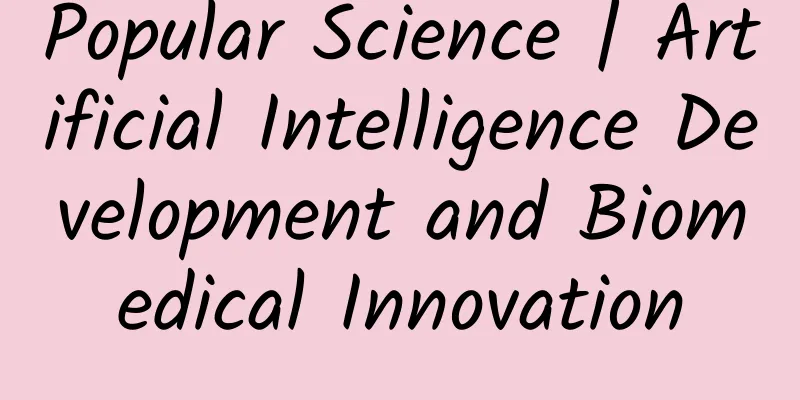Popular Science | Artificial Intelligence Development and Biomedical Innovation

|
In the technological wave of the 21st century, the deep integration of artificial intelligence (AI) and biomedicine is leading an unprecedented innovation revolution. This cross-border integration not only accelerates the research and development process in the field of biomedicine, but also greatly improves the accuracy and efficiency of medical services, bringing unprecedented opportunities to human health. Application of artificial intelligence in biomedicine 1. Drug development Drug development is a core link in the biopharmaceutical field. Traditionally, this process is time-consuming, costly and has a low success rate. However, the introduction of AI technology is changing this situation. Through deep learning and big data analysis, AI can quickly screen potential drug targets and predict the interaction between drugs and targets, thereby accelerating the discovery and optimization of lead compounds. In addition, AI can also simulate the metabolic process of drugs in the body, predict the toxicity and effectiveness of drugs, and significantly reduce the risk and cost of new drug development. For example, many start-ups such as Jingtai Technology and Insilicon Intelligence have successfully used AI technology to promote multiple new drug projects into the clinical trial stage. 2. Disease diagnosis and prediction AI has demonstrated amazing capabilities in medical imaging diagnosis. Through machine learning algorithms such as convolutional neural networks (CNN), AI can accurately identify and analyze medical imaging data such as X-rays, CT, and MRI, assisting doctors in discovering hidden lesions and improving the accuracy and efficiency of diagnosis. In addition, AI can also build disease prediction models based on big data analysis, and predict the occurrence and development trend of diseases by collecting multi-source information such as patients' medical history, genetic data, and lifestyle, providing a basis for early intervention and prevention. 3. Personalized treatment Each person's genome and living environment are unique, so personalized treatment has become an important direction for future medical treatment. AI can integrate multi-dimensional data such as the patient's genetic information, disease type, physical condition, etc. to tailor treatment plans for patients. In the field of tumor treatment, AI can determine the type of gene mutation, recommend targeted drugs, and adjust drug dosages to avoid adverse reactions by analyzing the patient's genetic sequencing data. This personalized treatment method not only improves the treatment effect, but also reduces unnecessary side effects. Challenges and Solutions Although AI has broad application prospects in the biomedical field, it still faces many challenges. 1. Data Privacy and Security Medical data contains a large amount of personal privacy information, so how to ensure the security and privacy of data has become a primary issue. To solve this problem, it is necessary to establish a strict data protection mechanism, adopt encryption technology and anonymization processing, and strengthen the supervision and constraints of laws and regulations. 2. Algorithm Explainability and Accuracy The complexity and unexplainability of AI algorithms limit their application in the medical field. In order to improve the transparency and credibility of algorithms, it is necessary to develop more explainable AI models and strengthen the verification and evaluation of algorithms. 3. Technical standards and ethical norms The differences in data formats and algorithm standards between different institutions have brought difficulties to the widespread application of AI technology. In addition, the development of AI technology has also raised many ethical and legal issues, such as intellectual property rights and liability. Therefore, it is necessary to establish unified technical standards and ethical norms to guide the healthy development of AI technology in the field of biomedicine. Future Outlook With the continuous advancement of technology and the expansion of its application scope, AI will play a more critical role in the biomedical field. In the future, we can expect AI to make greater breakthroughs in the following areas: ● Accelerate the development of new drugs: By continuously optimizing AI algorithms and models, shorten the transformation cycle of new drugs from laboratory to market and reduce R&D costs. ● Improve the quality of medical services: Use AI technology to improve the accuracy and efficiency of disease diagnosis and provide patients with more precise and personalized treatment plans. ● Promote the process of medical informatization: Through the deep integration of AI and medical informatization, achieve optimal allocation and efficient utilization of medical resources, and improve the overall efficiency of medical services. In short, the deep integration of artificial intelligence and biomedicine is leading an unprecedented innovation revolution. Facing a future full of challenges and opportunities, we need to continue to explore and innovate, promote the widespread application and healthy development of AI technology in the field of biomedicine, and contribute more wisdom and strength to the cause of human health. |
<<: "Red Heart" Sugarcane is Sweeter? Don't Eat Foods with These Conditions →
Recommend
Uterine melanoma
A woman's uterus is a special organ. Whether ...
Hard lump on right side of abdomen when lying down
The uterus is very important to the health of fem...
Why did I miss my period for 2 months?
If some women have problems with their bodies, th...
What to do if leucorrhea is like water
Healthy leucorrhea is a precious asset possessed ...
What should I do if a girl's breasts develop slowly?
Some girls have slow breast development. Many wom...
Will people who rely on coffee to "extend their lives" be healthier?
Coffee is a daily drink in modern people's li...
Is bare-hand pelvic floor massage reliable?
The woman's pelvis is a very important positi...
How to take care of your uterus?
Everyone hopes to have a young face and a healthy...
What should women with kidney deficiency eat? Recommend 4 kidney-tonifying dietary recipes
Kidney deficiency is also a common phenomenon in ...
Estrogen supplements for women
There are many therapeutic drugs that women can t...
What is the nutritional value of raw pumpkin seeds? What kind of garbage is pumpkin seed shell?
Pumpkin seeds, also known as white melon seeds an...
In the hot summer, be careful! The "number one killer" of foodborne diseases may be around you!
This is the 3866th article of Da Yi Xiao Hu On Ju...
How long does the NT test take?
After a woman becomes pregnant, she needs to have...
How to take care of your skin for women
With the changes of the times, many women pay mor...
There is still some blood in the vaginal discharge after menstruation
We all know that many people's menstruation i...









